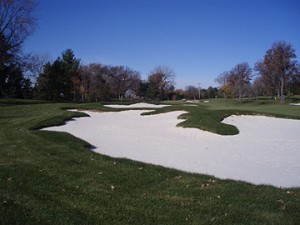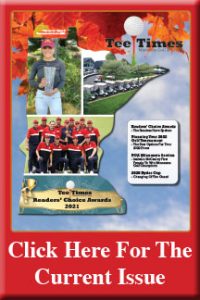A Top Superintendent: Jack MacKenzie
Being a top Superintendent is akin to being a celebrated Chef: the seasons are turbulent, the customers are particular, and the hours are oft-trying. But at the end of the day, players, like diners, arrive with both ample palates, and the expectance of a near-perfect presentation.
Recently, Judd Spicer of Tee Times caught up with Mr. Jack MacKenzie, Superintendent at North Oaks Golf Course. Aside from being one of Minnesota’s most active, and talented Super’s for over 30 years (the last 27 spent at North Oaks), MacKenzie is also editor of the nationally-recognized Hole Notes, published by the Minnesota Golf Course Superintendents’ Association.
The following is an excerpt of the type of knowledge, and passion, that MacKenzie serves up to both his players, and his readers:
Judd Spicer: Describe the “typical” day for a MN Superintendent during golf season; and also during the off-season:
Jack MacKenzie: Minnesota turf management season starts early in April and continues into November depending on the weather. Seasonal hours are often dictated by the sun rise as green staffs tend to begin their days early enough to keep ahead of play. During the hot months of June, July and August, when the sun’s intensity can do severe damage to the fine playing surfaces, long afternoon hours are common as the Super needs to be present to maintain the vigor of the turf through judicious irrigation practices. In season, a Superintendent’s days are kept very busy managing a diverse group of employees, communicating with the pro shop, club house, owners and membership about agronomic issues and turf management, and overseeing the operation of hundreds of thousands of dollars worth of equipment used to maintain the course. There is no such thing as a “normal” day. Weather dictates our schedules and infrastructure maintenance rule when there is a free moment. Superintendents also have to be aware of environmental issues, labor regulations, politically diverse player segments, budgets and financial information and seemingly to a lesser extent, agronomics.
During the off season Superintendents and their staff cut back on the hours yet keep busy prepping all of the golf course amenities for the upcoming season, maintaining the iron arsenal, trimming trees, forecasting budgets and attending continuing educational opportunities in order to maintain permits and licenses.
J.S.: Describe the Attention to Detail required to oversee a golf course- What are your biggest challenges?
J.M.: Besides being agronomists, turf professionals are the epitome of outdoor house keepers. Whatever the players do to mess up the course, either intentionally or unintentionally, we are responsible for repairing. It is our goal to provide the players and their guests the finest playing opportunity possible with restricted audible and visual distractions and keeping in mind budgetary and weather limitations. Fine detail is often dependent upon the budget available to the golf course manager. Limiting wear and tear caused by normal play and golfer traffic keeps us on our toes to prevent excessive labor expenditures on repairs. It is a real juggling act to balance mediating damage with getting in the golfers way.
J.S: What are a few things the average golfer would never assume goes into your job as Superintendent?
J.M.: Today’s Superintendent often must know the basics of a second language as well as the cultural differences and employment needs between all employees; young, old, foreign, male and female. The demands are seasonal and require a flexible management style to accommodate everyone’s needs while still maintaining a fine track. Golf course superintendents are quite prominent in promoting environmental stewardship throughout the course. They are naturalists who appreciate the importance of keeping their property healthy and full of diverse niches for all sorts of animals and plants.
J.S.: What is your approach/philosophy for editing Hole Notes?
J.M.: To provide an educational and entertaining publication that will stimulate my peers and encourage professionalism.
J.S.: I read in a recent article that Dr. Brian Horgan at the U of M (see above), said you were an ‘outside the box thinker.’ What does that mean in your mind as pertaining to the world of golf/golf courses?
J.M.: Some would consider me a maverick willing to take chances after a thorough review of potential outcomes. Dr. Horgan is an incredible asset to the State’s golfing public. His willing help is prompt, professional and always beneficial.
J.S.: What would you say are a few of the attributes required to be a top Superintendent?
J.M.: Because there are so many variables on a day-to-day basis, the Superintendent’s job is not a cookie cut position. Patience, foresight and the ability to multi-task are imperative skills a Superintendent must have. Even though schedules are made and intended to be followed, a rain event, frost, golf event or equipment failure will quickly put a Superintendent and their staff into “plan B” mode with the intent to limit impact upon play.



